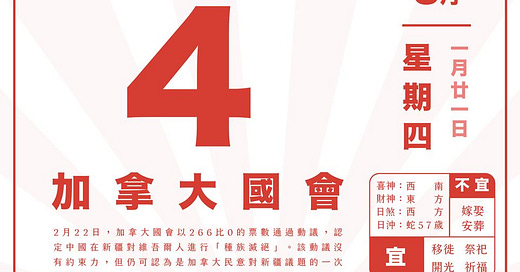CDT Weekly, February 27-March 4
Sensitive Words: Wuhan chrysanthemums, Canadian parliament, Lavitsef Gnirps Egabrag
Welcome to the fourth edition of CDT’s weekly email newsletter. With these updates, we aim to provide an overview of new content across CDT’s English and Chinese sites, as well as the bilingual China Digital Space wiki, and related content elsewhere.
CDT Chinese’s Sensitive Words calendar launched last Friday with “GFW” or “Great Firewall” as its inaugural entry. The following entries—some current, some long-established—rounded out its first week:
晚春圾垃 wǎnchūn jīlā—“Lavitsef Gnirps Egabrag,” or “Garbage Spring Festival” reversed. Criticism of the state broadcaster’s official Spring Festival Gala has been heavily censored, but negative comments were found to be postable on Weibo if their characters were reversed. A series of translated directives from CDT’s Minitrue Diary series illustrated the censorship implemented around last year’s broadcast. This year’s show drew international fire for its inclusion of dancers in blackface.
武漢菊花 Wǔhàn júhuā—“Wuhan chrysanthemum.” Chrysanthemums are associated with grief in China, and many Wuhan residents laid bouquets at the Lunar New Year to mourn those lost to the COVID-19 pandemic which began there a year ago. Demand this year was unusually high, many vendors sold out, and prices spiked. A local TV station came under heavy fire for trying to put a positive spin on the story by contrasting the booming sales with those depressed by the outbreak last year. Terms like “Wuhan + chrysanthemum” “Wuhan + flower market” were blocked to stem the backlash and tamp down broader dissent from the triumphalist official narrative on COVID-19.
Clubhouse—Chinese-language discussion on the U.S.-based audio chat service has continued despite its widely anticipated blocking in China early last month, which followed widely publicized sessions on mass detentions in Xinjiang and other sensitive topics. CDT (@cdtimes) has hosted Q&A sessions with Eric Liu on his experience in content monitoring and censorship at Weibo and Leshi, and with UCLA’s Michael Berry on his work translating Fang Fang’s controversial Wuhan Diary on life during last year’s lockdown.
蛋炒飯節 dàn chǎofàn jié—“Egg Fried Rice Festival,” or November 25, on which Mao Zedong’s eldest son Mao Anying was killed in an airstrike during the Korean War. U.S. bombers were allegedly alerted to the location of his unit by smoke from a stove lit in defiance of orders after he demanded egg fried rice for breakfast. Some Chinese view the event as China’s salvation from North Korea-style dynastic rule, and celebrate it accordingly. Last year, cooking vlogger Wang Gang came under nationalist attack after posting an instructional video on egg fried rice on October 23, the eve of Mao Anying’s birthday.
草泥馬 cǎonímǎ—The mythical alpaca-like “Grass Mud Horse” after which CDT’s Lexicon of online slang is named, whose name is coincidentally homophonous with an Oedipal curse, and which has long been a symbol of free speech on the Chinese internet.
加拿大國會 Jiānádà guóhuì—The Canadian parliament, which voted on February 22 to condemn the ongoing mass detention and other abuses in Xinjiang as genocide. There were no votes against the motion, though Prime Minister Justin Trudeau and his cabinet were among those abstaining. Searches for terms including “Canada + parliament” and “Canada + Winter Olympics”—referring to efforts to boycott the Beijing-hosted 2022 games—were blocked on Weibo, while those for “Xinjiang genocide” returned only officially approved results.
The Chinese team is also publishing weekly digests of emerging Sensitive Words, and has updated CDT’s long-running project to track new ones through crowdsourced reporting. Recent additions include several of the terms from last week’s calendar entries and related combinations; “Xi Jinping + elementary school education,” a scathing reference to Xi’s disrupted schooling for which one WeChat user was reportedly “invited to tea” by police; and “Marilyn Monroe,” the handle of a Weibo user who posted a poetic catalog of tragedies from Wuhan last year, and was sentenced to six months in prison for “picking quarrels and provoking trouble” last month.
Online tributes to “Marilyn” have continued, with CDT Chinese continuing to track them. The arrests or “online pursuit” of seven other people for online comments “defaming the People’s Liberation Army” over clashes with India in the Galwan valley has been another recent focal point. On Monday, Nanjing police released video of one of the seven apologizing and describing his behavior as “unconscionable.” Yet another recent case involves the suspected arrest of a Beijing delivery driver for posting about exploitative business practices against his fellow “knights” in the now notoriously high-pressure industry. CDT English has compiled and translated reporting on this and other recent cases.
Other content from CDT Chinese this week includes its regular weekly content summary and monthly roundups of online commentary, videos, and censorship news from February 2021.
Meanwhile, CDT English surveyed coverage of:
… subversion charges against 47 prominent Hong Kong pro-democrats under the city’s new National Security Law, their own statements, and international reactions.
… recent reports on abuses in Xinjiang’s mass detention camps, and efforts by Chinese officials to discredit their sources.
… Xi Jinping’s declaration of victory in China’s battle against poverty in a more than hour-long speech last Thursday, and various experts’ views on the remaining challenges.
… concerns about the emerging field of “emotion recognition” technology.
… the effects of a new 30-day “cooling-off period” for divorce filings, and its entanglement with issues of demographics and domestic violence.



